
A lack of sleep at night can make you feel drowsy and unfocused during the next day with lack of energy, and an irritable mood. Getting adequate sleep (seven to nine hours a night) helps your mind and body relax and recover from your day. Sleep also keeps your heart healthy, regulates your blood sugar, keeps your immune system strong, and helps you maintain a healthy weight.
There are some indoor plants that give off scents that have been proven to calm nerves and help you sleep better. Also air purifying plants have the ability to remove pollutants, and release oxygen, freshening your air for a more soothing sleep. Let’s explore what are these best indoor plants to include in your bedroom.
1. Jasmine

For centuries, jasmine has been used in Asia as a natural remedy for depression, anxiety, and insomnia. Jasmine is famous for its beautiful white flowers and heady fragrance. It has sedative effects on the nervous system, which make it easier for you to fall asleep.
According to researchers in Germany, the Jasmine flower fragrance can be used as an alternative to sleeping pills. So, having jasmine plant in your bedroom will help you to have a good night’s sleep!
4. Gardenia
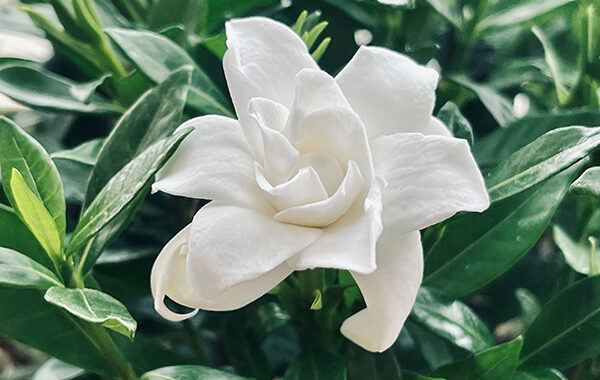
Gardenia is well-known for its intoxicating fragrance, showy, creamy-white flowers, and its dark green leaves. The exotic fragrance of gardenia lowers stress levels, and promotes relaxation. One study showed that a certain gardenia extract tended to improve the quality of sleep. Gardenia is used in Traditional Chinese Medicine to treat high blood pressure, insomnia, anxiety. The antibacterial properties of gardenia could clean the air of airborne pathogens. Don’t confuse gardenia with jasmine. These are not the same.
3. Lavender
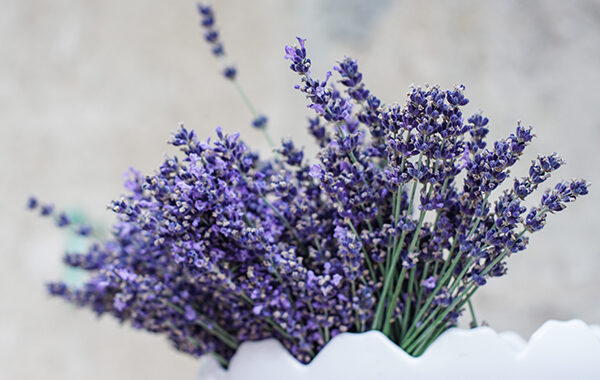
The sweet floral scent of lavender is known to reduce anxiety and calm the mind. In history, people stuffed their pillows with lavender flowers to help them fall asleep and get a better night’s rest. Some studies suggest lavender can improve your body’s melatonin levels which, in turn, helps promote sleep. Melatonin is a hormone produced by the pineal gland which helps your body know when it’s time to sleep and wake up. You might be happy to learn that lavender has a strong scent that can repel fleas, flies, moths and mosquitoes.
4. Chamomile
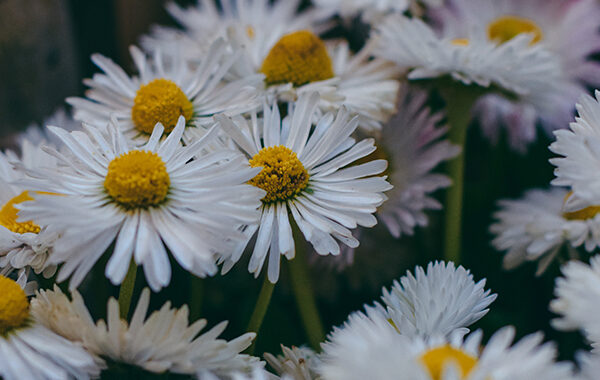
Just smelling chamomile can help you feel more relaxed and sleepy. It has been used as an herbal remedy since the Ancient Egyptian times. Chamomile is one of the richest natural sources of apigenin which binds to certain receptors in your brain that may have a sedative and relaxing effect.
5. Spider plant
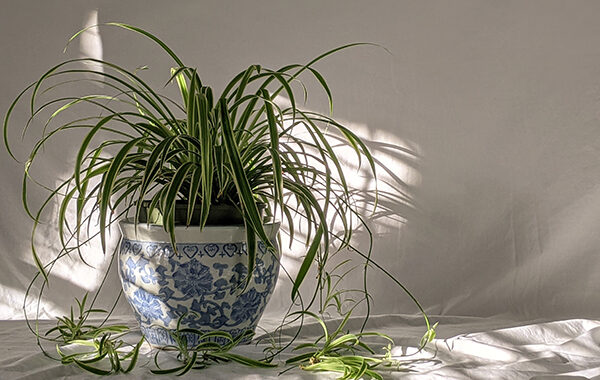
The biggest benefit of spider plant is its ability to filter and purify the air in your home. It is effective in cleaning indoor air by absorbing chemicals from the air, such as carbon monoxide, formaldehyde, xylene and toluene. NASA’s study found that spider plants removed 95 percent of formaldehyde from a sealed Plexiglas chamber in 24 hours.
Spider plants have impressive therapeutic benefits. Studies have shown that the patients in hospital rooms with spider plants felt less pain, didn’t suffer from blood pressure or heart rate issues, and experienced less anxiety or depression compared to patients in rooms without a plant.
6. Peace lily

Peace lily is a good choice for bedrooms because of its attractive appearance and air-purifying abilities. According to a famous NASA experiment, a peace lily plant may absorb contaminants including formaldehyde, benzene, carbon monoxide, and toluene.
The humidity level can also impact your sleep quality. Because of their native tropical environment, they enjoy humidity and absorb it naturally. Another benefit of having a peace lily in the bedroom is that it can control sound pollution in the interior space due to its broad and thick leaves.
7. Aloe vera
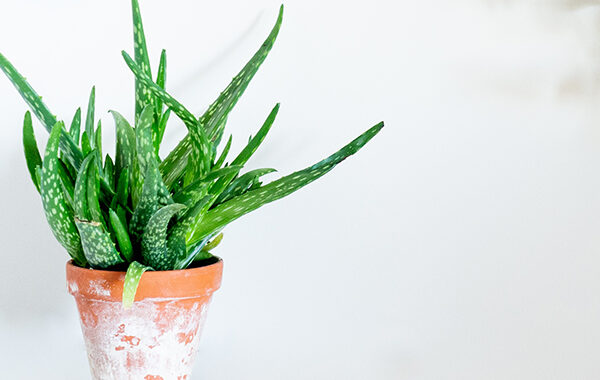
Aloe vera is known for its ability to release oxygen at night and absorb the carbon dioxide you breathe out. Having a plentiful supply of oxygen while you sleep improves sleep quality, makes it deep, peaceful and more relaxing. This attractive plant can also purify and detoxify the air containing formaldehyde and benzene, which are found in many household products such as chemical-based cleaners, paints and pesticides.
8. Passion flower
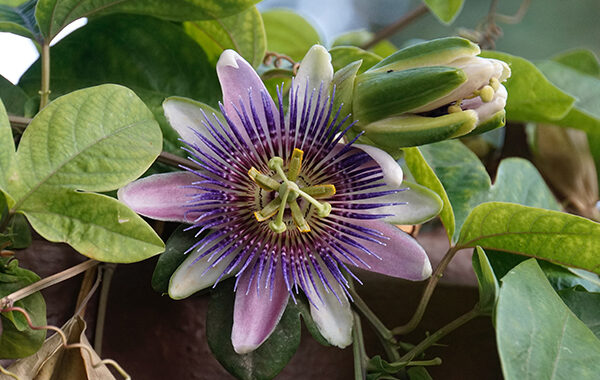
Passion flower is a climbing vine with white and blue or purple flowers native to southeastern North America. Native Americans have used passionflower to treat insomnia, anxiety and pain. Researchers found that drinking tea containing purple passionflower could help those with mild sleep irregularities.
This tropical vine needs warmth, full sun with at least 4 hours of sunlight a day and high humidity levels to grow well.
9. English ivy
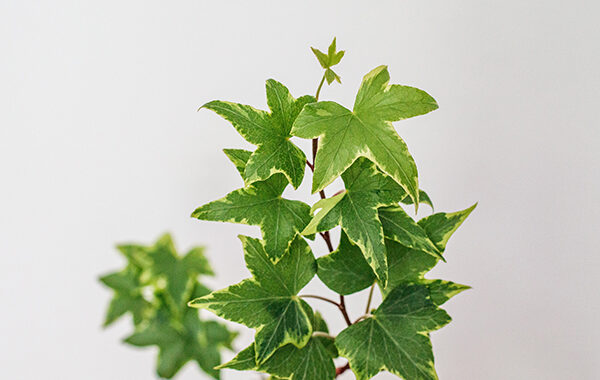
English ivy is an evergreen climbing ornamental vine that require minimal care. When kept indoors as a houseplant, English ivy may help in reducing air pollution. According to NASA’s clean air study, English Ivy is effective at cleansing VOCs (Volatile Organic Compounds) like toluene, formaldehyde, benzene, trichloroethylene, and other toxins from the air.
English Ivy can also reduce the levels of mold in the air of your home according to research presented to the American College of Allergy, Asthma & Immunology back in 2005. Breathing mold can cause allergic and respiratory infections.
10. Orchids
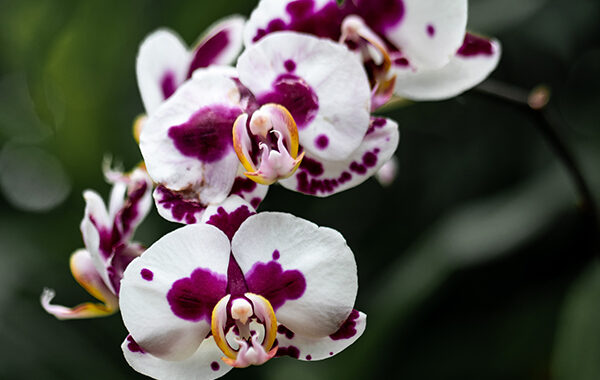
Orchids have positive emotional effects that can help you relax. This makes them a perfect choice to settle in the corner of your bedroom. These flowering plants release oxygen at night which can help you breathe better and sleep more deeply. Your brain needs a sufficient supply of oxygen to function properly. NASA researchers found that dendrobium orchids could improve indoor air quality by removing toxic compounds like xylene and toluene from the air.
Going to sleep and waking up around the same time every day can help you sleep better at night.